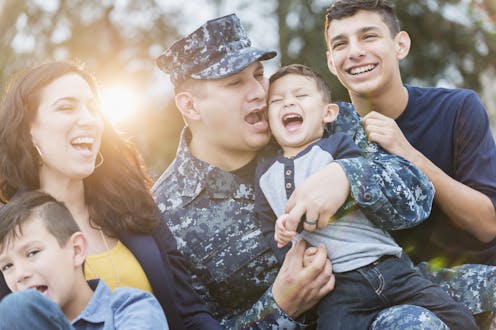Children in military families face unique psychological challenges, and the barriers to getting help add to the strain
- Children in military families face unique psychological challenges due to frequent relocations, deployments, and the constant threat of war, which can lead to depression, anxiety, and suicidal thoughts.
- Military children are more likely to experience mental health issues than their non-military peers, including depression, alcohol abuse, and suicidal thoughts, with some studies showing a slight increase in suicide deaths among military families from 2011 to 2022.
- Securing firearms at home can help prevent tragedies, as research shows that military-connected youth with mental health challenges are less likely to carry guns when they have access to support services.
- The stigma surrounding mental health is a significant barrier for many military families, who may view seeking help as a sign of weakness or vulnerability, but efforts by the Defense Department and nonprofits are working to decrease this stigma and increase access to psychological health services.
- Expanding youth- and family-focused programs can have long-term benefits for both individual military families and the nation as a whole, as children from military families are more likely to serve in the military themselves, making it essential to prioritize their psychological well-being at an early age.

“When one person joins the military, the whole family serves.”
The origin of this statement is unknown, but it captures the reality that military families confront in 2025. One member’s service shapes the lives of the entire family.
Here’s a look at the numbers: More than 2 million Americans serve in the U.S. military. About 1.3 million are on active duty, nearly half of them are married, and just over one-third have children. Many of the rest are otherwise partnered, or they live with extended family members.
These military families encounter unique psychological stressors. Frequent relocations disrupt a spouse’s job, a child’s schooling, and family routines. Deployments and the constant threat of war may strain relationships. For dual-military couples, these pressures are compounded. For them, prolonged separation and increased child care needs are even more common.
We are a clinical psychologist and a clinical trauma epidemiologist. Both of us are at the University of Colorado Center for COMBAT Research, where one of our core missions is to improve the psychological health of these families through education, innovation and high-impact research.
Depression, alcohol and suicidal thoughts
Most military families demonstrate remarkable resilience and lead happy, healthy, and productive lives. For so many of them, being part of a military family and serving their country is a source of great pride and honor.
But numerous studies show that military children are also more likely to face a range of psychological issues than their nonmilitary peers. They experience more depression and drink more alcohol; they are more likely to attempt suicide; and when a military parent is wounded, they are more likely to express suicidal thoughts. What’s more, from 2011 to 2022, the suicide death rate for children and spouses in military families slightly increased.
Military families can take a simple step to stop at least some of these tragedies – by securely storing personally owned firearms, particularly when a child is in the home. This is recommended by the Department of Defense, Department of Veterans Affairs, as well as firearm trade associations and firearm businesses.
Word seems to be getting out: Research shows military-connected youth with mental health challenges are less likely than peers to carry guns.
Overcoming barriers
All this is happening at a time of unprecedented challenges for military families. The U.S. military is enhancing warfighter readiness; increased training requirements may take service members away from home for weeks to months at a time, adding to family stress. What’s more, future military conflicts will likely mean longer deployments.
One barrier to getting psychological help is the stigma surrounding mental health. The military promotes a culture of self-reliance and resiliency under pressure – and for good reasons. But for many military families, seeking help is seen as a sign of weakness. Admitting to having struggles is often perceived as vulnerability, and some military members think asking for help may harm their career. Some of these ethos appear to extend to family members as well.
The Defense Department, along with several nonprofits, has made significant efforts not only to decrease stigma, but also increase services that foster psychological health. Research shows existing programs do help. This includes free services from Military OneSource, Military and Family Life Counseling, Families OverComing Under Stress and 4-H Military Partnership. But despite what appears to be an abundance of these programs, many military members and their families are still unaware they exist or have difficulty accessing them.
Children from military families are more likely than peers to serve in the military. That means protecting their psychological well-being at an early age may ultimately translate to a stronger military in the next generation. Expanding youth- and family-focused programs is an investment, not only in these families, but in the future of the nation.
![]()
Ian H. Stanley receives funding from the U.S. Department of Defense, USAA/Face the Fight Foundation, and the Patient-Centered Outcomes Research Institute. He is affiliated with the Scientific Advisory Board for Face the Fight.
Anne Ritter receives funding from the U.S. Department of Defense.
